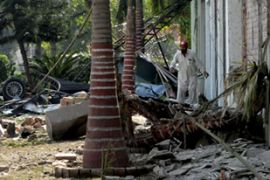Blasts strike across Pakistan
Explosions go off in three different parts of the country as PM calls security meeting.

Waseem Shah, a journalist with Pakistan’s Dawn TV, told Al Jazeera: “The occupants of the car parked the car in a small restaurant, also housing a wedding hall, snooker club and video club where youngsters visit.”
| FROM THE BLOGS | |||
|
Shah said that there were no apparent government or military links to the area.
Al Jazeera’s Imran Khan, in Islamabad, said: “This neighbourhood is supposed to be a safe neighbourhood. But it has been rocked by kidnappings for ransom over the past year.
“We’ve heard a local government official condemn the attack, saying in very clear terms that this was an attack against innocent civilians. When you attack restaurant parking lots you are attacking the population of Pakistan.
“The Taliban for their part have said that they only attack security apparatus.”
The explosion in Peshawar occurred barely hours after a suicide bomb blast left at least seven people dead and nine others wounded at a military base near the country’s capital.
Defence office targeted
The attack occurred close to the Kamra aeronautical facility, about 80km west of Islamabad.
| In depth | |||||||||||||||||||
|
The assailant was reportedly riding a bicycle and detonated the bomb when stopped at a security checkpoint on the access road to the complex, police said.
Fakhar Sultan, the district police chief, said two air force personnel were among the dead.
The complex at Kamra or its workers have been targeted at least once before, in December 2007, when a suicide car bomber struck near a bus carrying children of air force employees, wounding five of them.
Azam Tariq, a spokesman for the Pakistani Taiban, claimed responsibility for the Peshawar attack, and an earlier gun attack on a military vehicle in Islamabad on Thursday, which killed a brigadier and his driver.
Meanwhile, millions of students have been kept at home this week as Pakistan shut all schools and colleges after a suicide attack on Tuesday at a university.
On October 10, fighters staged an ambush on the army headquarters in Rawalpindi. It was later claimed by the Tehreek-e-Taliban in Pakistan.
Almost three weeks of attacks by the Pakistani Taliban have left about 170 people dead.
Security meeting
The surge in violence comes as the military’s offensive against the Pakistani Taliban in South Waziristan enters its seventh day.
Al Jazeera’s Alan Fisher, in Islamabad, said: “Everywhere, as far as the Taliban is concerned, is a legitimate target if it involves the security forces, the police and the army.
|
|
| Exclusive report: Thousands flee South Waziristan as the conflict escalates |
“Everyone is wary of what will happen next and because of this the prime minister [Yusuf Raza Gilani] has summoned a special security meeting in Islamabad which will take place today.
“He has summoned senior advisers and politicians, including representatives from the provinces and also people who can feed into the process, to see how they can try to cope with the problems that they are facing.”
Gilani condemned the Kamra attack and vowed that the government would not waver in its resolve to “root out terrorism”.
“They knew that when the South Waziristan offensive started that there was always the possibility of a backlash and that’s what we are seeing,” our correspondent said, referring to the Pakistani authorities.
“[The government] is aware that they have to do something, because people are scared. You can see it on the streets, in the fact that there is not as much traffic around as usual, that the markets are quieter, cinemas across the country are reporting that attendances are down.”
Our correspondent said the army officers believe that if they can confront and defeat the Taliban in South Waziristan, then other groups around the country will adapt to the new realities.
“It’s a risky strategy,” he said. “If it fails, it allows others to push on with their agenda and carry out attacks.”

